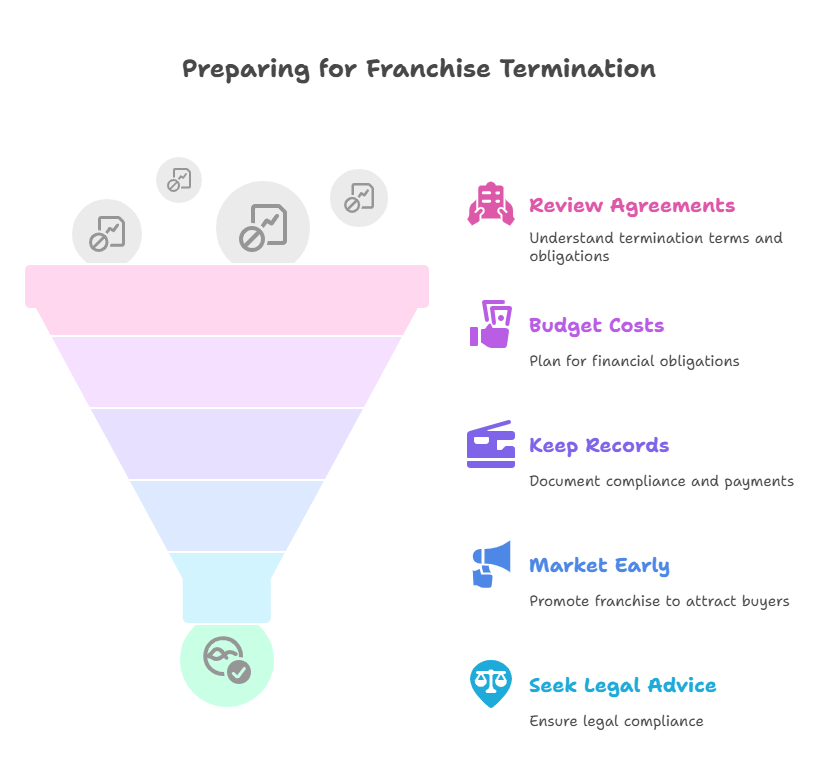Franchise ownership ties you to a contract that controls operations, branding, and financial duties. Ending this contract early can feel complex, with legal, financial, and practical challenges, especially in Canada’s regulated franchise system. In Toronto, laws like Ontario’s Arthur Wishart Act (Franchise Disclosure), 2000 shape the process.
Whether you’re a franchisee facing rising costs or a franchisor dealing with a breach, understanding what happens if you cancel a franchise agreement? process is vital. This guide explains the steps, risks, and options in clear terms. By the end, you’ll know how to:
- Navigate legal outcomes of termination.
- Manage financial costs like fees and lease penalties.
- Resolve disputes through mediation or arbitration.
- Handle post-termination duties and plan an exit.
Can a franchisor terminate a franchise agreement?
Yes, a franchisor can terminate a franchise agreement if the franchisee breaches the terms, such as failing to pay royalties, not adhering to brand standards, or violating non-compete clauses. The agreement typically outlines specific conditions and notice periods for termination, and if the franchisee does not correct the issue within the designated cure period, the franchisor can proceed with termination.
Termination Rights and Obligations in Franchise Agreements
A franchise agreement is a legal contract between you, the franchisee, and the franchisor. It sets rules for operations, royalties, and brand use. In Canada, the Franchise Disclosure Document (FDD) is key. Ontario’s Arthur Wishart Act requires franchisors to share details on fees, training, and the franchise agreement cancellation process before you sign. This ensures clarity.
Termination happens in three main ways:
- Mutual agreement: You and the franchisor both agree to end the contract.
- Early termination of franchise: You exit before the term ends, often due to financial or strategic reasons.
- Breach of franchise contract: Non-compliance, like missing royalty payments, triggers termination.
The agreement’s termination clauses list conditions, such as 30–60 day notice periods or cure periods to fix issues. In Toronto’s busy franchise market, these clauses prevent costly mistakes. The Act demands fair dealings, but compliance is strict.
If you’re looking for insights on franchise disclosure documents and their importance when expanding to the U.S., our guide offers a detailed breakdown to help ensure compliance.
Legal Outcomes of Ending a Franchise Agreement
Ending a franchise agreement brings legal consequences under Canadian law. A breach of franchise contract, like failing to follow brand standards, may lead to a default notice. This notice gives you a cure period, typically 30–60 days, to correct the issue. If you don’t, the franchisor can terminate the contract. They may then enforce franchisor rights after termination, such as protecting trademarks or non-compete clauses.
Ontario’s Arthur Wishart Act protects franchisees by requiring fair treatment. You must stop using the franchisor’s brand after termination. Breaking a non-compete clause, like starting a similar business nearby, can lead to lawsuits. In Toronto, with its many franchises, disputes are common. A franchisee who used branded materials post-termination faced a $20,000 lawsuit. Knowing local laws, like the Act’s rules, helps you avoid legal trouble and plan effectively.
For more information on the best legal structure for franchises and how it can optimize your U.S. expansion, be sure to check out this blog.
Financial Costs of Franchise Termination
Terminating a franchise agreement can strain your finances. Franchise termination fees, listed in the contract, may include unpaid royalties, marketing fees, or early-exit penalties. These can range from $10,000 to $50,000, depending on the franchise size. If you lease a space, ending the lease early in Toronto’s costly areas, like Bay Street, might cost months of rent.
Closing your business adds expenses: settling supplier debts, selling inventory, or paying staff severance. These costs can total $20,000–$100,000 for a mid-sized franchise. The consequences of ending a franchise contract also include losing part of your initial investment, like equipment costs. The Arthur Wishart Act requires cost disclosure in the FDD. Learn how to assess termination costs with a free consultation from Cloudhaus Law. A Toronto franchisee who ignored their FDD paid $30,000 in unexpected fees. Planning ahead reduces these risks.
Resolving Disputes in Franchise Agreements
Disputes often arise during termination over fees, breaches, or restrictions. Canadian law offers dispute resolution in franchise agreements options:
- Mediation: A neutral party helps you reach an agreement, saving time and money.
- Arbitration: An arbitrator issues a binding decision, faster than court.
- Litigation: Court cases, costly but needed for complex disputes.
Ontario’s Arthur Wishart Act requires good-faith negotiations. In Toronto, mediation is common due to high legal costs. A franchisee settled a fee dispute through mediation, saving $15,000. Check your agreement for dispute clauses, as some mandate arbitration. Early action prevents escalation. For example, a Toronto franchisee avoided litigation by addressing a breach during the cure period. Understanding these options, rooted in Canadian law, helps you manage conflicts and protect your interests.
Post-Termination Responsibilities and Exit Planning
After termination, you face franchisee obligations after cancellation:
- Stop using the franchisor’s trademarks, logos, or systems.
- Follow non-compete clauses, which may limit similar businesses for 1–2 years in a set area.
- Return confidential items, like operations manuals.
Franchisors must enforce brand rules fairly, per the Arthur Wishart Act. Exit strategies include:
- Mutual termination: Agree with the franchisor to lower penalties.
- Franchise agreement exit clauses: Transfer the franchise to a new owner, recovering 50–80% of your investment.
- Early planning: Review terms to avoid breaches.
In Toronto’s competitive market, exits need care. A franchisee who transferred their gym franchise saved $35,000. The infographic below shows the process:
Additional Factors in Canadian Franchise Termination
Franchise laws differ across Canada. Ontario’s Arthur Wishart Act stresses disclosure and fairness, while Alberta’s Franchises Act may require 60-day notices. Toronto’s 2,000+ franchises in food, retail, and fitness face high dispute risks, especially over non-compete clauses. A franchisee who opened a similar business too soon faced a $100,000 lawsuit.
The FDD Compliance details transfer rights, which can recover 50–80% of your investment. Franchisors often approve transfers, adding steps. Tax issues, like capital gains, vary by business structure, per Canada Revenue Agency rules. Toronto’s fast-changing market, with trends like e-commerce, may push franchises to exit if they can’t keep up. For example, a retail franchisee who couldn’t adapt to online sales planned a transfer, recovering 60% of their investment. These factors highlight the need for strategic planning.
Steps to Prepare for Franchise Termination

Prepare with these steps:
- Review the FDD and agreement for termination clauses, non-competes, and transfers.
- Budget for fees, royalties, and lease costs, which may total $20,000–$100,000.
- Document payments and compliance to support disputes.
- Market the franchise early for transfers, as Toronto’s popular brands attract buyers.
- Consult a professional for Canadian law compliance.
A Toronto franchisee saved $30,000 by addressing issues in the cure period. Early action leverages franchise agreement exit clauses to minimize risks in a competitive market.
Why Pick Our Franchise Law Services? Your Success, Our Guarantee
We’ve helped more than 80 franchise locations across Canada set up their legal structures the right way from the start. Whether you’re buying your first unit or scaling to a multi-unit enterprise, the legal groundwork matters.
At Cloudhaus Law, we provide:
- Flat-fee pricing, so there are no billing surprises
- Legal support from a dual-licensed lawyer (Canada/U.S.)
- Experience across industries including retail, food service, and service-based franchises
- Virtual consultations tailored for Ontario and national clients
One client who opened a franchise in Mississauga started with one location. We helped them incorporate, meet franchisor requirements, and later restructure to support two additional units. Their expansion was seamless because their legal base was sound from day one.
Common Questions on Franchise Agreement Cancellation
Can a franchise agreement be terminated early?
Yes, through mutual agreement or contract terms allowing early termination of franchise. A franchise lawyer Toronto can review clauses to reduce risks under Ontario’s Arthur Wishart Act.
What penalties apply if I cancel a franchise agreement?
Franchise agreement legal penalties include royalties or lump-sum fees, often $10,000–$50,000, based on the contract.
Do I have to pay fees after ending a franchise contract?
You may owe royalties or penalties post-termination. The FDD, required by law, clarifies these costs.
Can the franchisor sue me for breaking the agreement?
Yes, breaking a franchise agreement risks lawsuits, especially for non-compete breaches. Compliance lowers this risk.
What happens to my franchise location after termination?
You may close or transfer the location, facing lease penalties. Toronto’s high rents require careful planning.
Will I lose my investment if I cancel a franchise?
You may lose some or all investment due to fees or losses. Transfers can recover funds.
How can I legally exit a franchise without penalties?
Use mutual termination or transfer rights. A lawyer ensures compliance with Canadian laws.
Client Testimonial: Navigating Termination
“I faced rising costs with my Toronto franchise and needed to terminate. Non-compete clauses and fees were confusing. Cloudhaus Law’s clear guidance and knowledge of Ontario’s Arthur Wishart Act helped me negotiate a mutual termination, saving $40,000 in penalties. Their support was practical and straightforward.” – Michael R., Toronto Franchisee
This shows how expert advice simplifies the franchise agreement cancellation process, helping you achieve a better outcome.
Final Thoughts: Cancel with Strategy, Not Regret
Ending a franchise agreement is more than just walking away from a business. It’s a legal process with real financial and reputational consequences. Whether you’re a franchisee managing rising costs or a franchisor dealing with non-compliance, your next steps must be carefully planned.
Understanding your termination rights, the financial impact, and your obligations under Canadian law, especially Ontario’s Arthur Wishart Act is essential. From fees and non-compete clauses to dispute resolution and transfer options, every decision you make shapes your business future.
At Cloudhaus Law, we help you navigate every stage with clarity and strategy. Our experience across more than 80 franchise locations means we know what it takes to exit smoothly and protect what you’ve built.
Ready to cancel your franchise agreement the smart way? Book your free consultation at cloudhauslaw.com or call (647) 965-0516 to get started.






